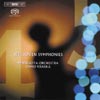Beethoven Symphonies Nos 4 and 5
Fiery, elegant, bristling with character – this is impressive Beethoven
View record and artist detailsRecord and Artist Details
Composer or Director: Ludwig van Beethoven
Genre:
Orchestral
Label: BIS
Magazine Review Date: 3/2005
Media Format: Super Audio CD
Media Runtime: 67
Mastering:
Stereo
DDD
Catalogue Number: BISSACD1416

Tracks:
| Composition | Artist Credit |
|---|---|
| Symphony No. 4 |
Ludwig van Beethoven, Composer
Ludwig van Beethoven, Composer Minnesota Orchestra Osmo Vänskä, Conductor |
| Symphony No. 5 |
Ludwig van Beethoven, Composer
Ludwig van Beethoven, Composer Minnesota Orchestra Osmo Vänskä, Conductor |
Author: Richard Osborne
It was during Osmo Vänskä’s time with the BBC Scottish SO that his Beethoven began winning golden opinions. There was an admired recording of the Pastoral Symphony, given away with a magazine, and a Proms performance of the Seventh Symphony which David Gutman described as ‘terrifically fresh and alert’ (BBC Proms, 11/99). Vänkä’s new recording of the Fourth Symphony is that, and more. His account of the Fifth also bristles with character.
Where the Fourth is concerned, I confess to a bias in favour of readings which match Apollonian loveliness with Dionysiac drive. Toscanini blazed the trail with his glorious 1939 BBC SO recording; Karajan followed in 1962 with a Berlin performance of unimaginable grace and fire; and Rattle was not far behind with his 2002 Vienna Philharmonic account. Vänskä’s reading is comparable to these: fiery but not relentless. Metronome marks are important but not mandatory. Transparent textures and a rigorous way with dynamics also feature. Of particular interest is the skill with which Vänskä keeps the bass line, and thus the music’s harmonic contour, continuously in view, never easy to do given the ‘open’ nature of Beethoven’s scoring.
The Minnesota Orchestra are extraordinarily proficient: fleet-footed and articulate, though tonally they have less in reserve than the Berlin or Vienna orchestras. This can be a limitation in the Fifth Symphony where the sound occasionally edges towards coarseness but it makes little or no difference in the Fourth, even in the Adagio. What Vänskä sacrifices in lyric poetry he makes up for in justness of rhythm and chasteness of texture. A word of warning, though. Skilful as BIS’s engineers are in dealing with the quietest of Vänskä’s pianissimi, finding an optimum playback level for the vibrant but pianissimo-strewn Fourth takes a certain amount of time and patience.
Vänskä’s performance of the dynamically less problematic Fifth is also highly explicit (I have never heard antiphonally divided second violins play with such distinctness and fire). It is an urgent performance and a substantial one. Typically, Scherzo and finale are bound to one another structurally but not tamed emotionally.
The text, I imagine, is new Bärenreiter, though Vänskä makes a couple of aurally arresting modifications to the timpani parts in the finale of the Fifth. (The final bar has always been problematic.) Like all good Beethovenians, he is clearly not afraid to be his own man.
Where the Fourth is concerned, I confess to a bias in favour of readings which match Apollonian loveliness with Dionysiac drive. Toscanini blazed the trail with his glorious 1939 BBC SO recording; Karajan followed in 1962 with a Berlin performance of unimaginable grace and fire; and Rattle was not far behind with his 2002 Vienna Philharmonic account. Vänskä’s reading is comparable to these: fiery but not relentless. Metronome marks are important but not mandatory. Transparent textures and a rigorous way with dynamics also feature. Of particular interest is the skill with which Vänskä keeps the bass line, and thus the music’s harmonic contour, continuously in view, never easy to do given the ‘open’ nature of Beethoven’s scoring.
The Minnesota Orchestra are extraordinarily proficient: fleet-footed and articulate, though tonally they have less in reserve than the Berlin or Vienna orchestras. This can be a limitation in the Fifth Symphony where the sound occasionally edges towards coarseness but it makes little or no difference in the Fourth, even in the Adagio. What Vänskä sacrifices in lyric poetry he makes up for in justness of rhythm and chasteness of texture. A word of warning, though. Skilful as BIS’s engineers are in dealing with the quietest of Vänskä’s pianissimi, finding an optimum playback level for the vibrant but pianissimo-strewn Fourth takes a certain amount of time and patience.
Vänskä’s performance of the dynamically less problematic Fifth is also highly explicit (I have never heard antiphonally divided second violins play with such distinctness and fire). It is an urgent performance and a substantial one. Typically, Scherzo and finale are bound to one another structurally but not tamed emotionally.
The text, I imagine, is new Bärenreiter, though Vänskä makes a couple of aurally arresting modifications to the timpani parts in the finale of the Fifth. (The final bar has always been problematic.) Like all good Beethovenians, he is clearly not afraid to be his own man.
Discover the world's largest classical music catalogue with Presto Music.

Gramophone Digital Club
- Digital Edition
- Digital Archive
- Reviews Database
- Full website access
From £8.75 / month
Subscribe
Gramophone Full Club
- Print Edition
- Digital Edition
- Digital Archive
- Reviews Database
- Full website access
From £11.00 / month
Subscribe
If you are a library, university or other organisation that would be interested in an institutional subscription to Gramophone please click here for further information.




